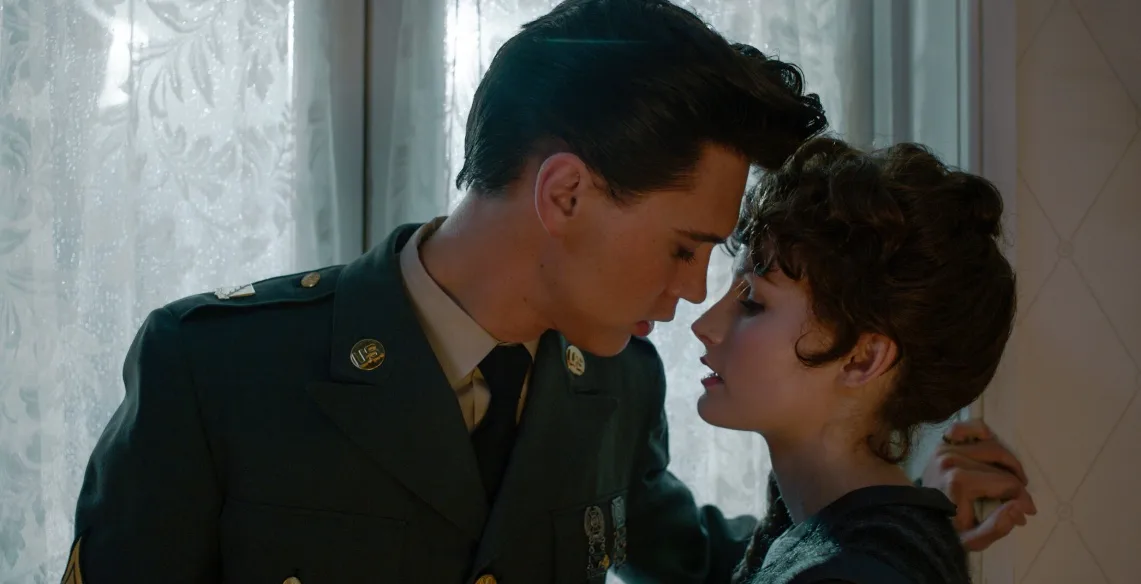
Film Review: Elvis
Film Reviews
Elvis
Director: Baz Luhrman
Bazmark Films
In Theaters 06.24
It’s so obvious that Baz Luhmar and Elvis are meant for each other that to call it an inspired match feels inadequate. When I was in my 20s and held a very set idea of what a well-directed movie looked like, Baz Luhrman rocked my world with Moulin Rouge! and opened my eyes to new possibilities, much the same way that Elvis Presley did for the world of popular music.
Elvis chronicles the life and musical career of Elvis Presley (Austin Butler, Once Upon A Time… In Hollywood) and the complex relationship between the superstar and his enigmatic manager, Colonel Tom Parker (Tom Hanks) while also offering a look at the cultural significance of Presley’s career in a changing nation. Parker narrates the film from his deathbed, defending his controversial role as both manager and keeper of the greatest rock star of all time, seeking validation and even thanks for bringing the King to the world. The facts speak for themselves, however, and Parker, who serves as both protagonist and antagonist rolled into one, watches along with us, his own memories simultaneously proving his claims of discovering greatness while also indicting him for manipulating, exploiting and victimizing Elvis every step of the way
Neither Luhrman nor Presley have ever been known for their subtlety, and from the opening shot of a gaudy, gold encrusted Warner Bros logo, it’s clear that we’re not getting a movie that’s meant to be viewed through the lens of realism. Luhrman unabashedly celebrates his and Elvis’ shared sensibility of kitschy, over-the-top excess and, as both have demonstrated in their careers, a simple, heartfelt sincerity and wide-eyed love for entertaining. As an Elvis enthusiast who long ago did a deep dive into both the mythology and the reality of the King’s life, I was entranced by the attention to detail mixed with a fanciful tendency to favor what we want to see and feel as opposed to straightforward truth.
Butler’s jubilant performance is so dead-on that it’s intoxicating. He does all of the singing himself during Elvis’s younger years, though as he ages and becomes more of a larger-than-life figure, Luhrman increasingly blends the King’s recordings with Butler’s performance to create a hybrid. As far as Hanks is concerned, the role is a major departure for an actor who is known not only for playing nice guys but for doing it without gimmick or affectation. Between the accent and the heavy makeup and padding, Hanks is taking on more artifice than in any movie he’s done, with the exception of Cloud Atlas. Sometimes it works, and sometimes it doesn’t, and what makes this casting feel justified and strangely brilliant is the twinkle-in-the-eyes charm that helps those of us who know this story so well finally catch a glimpse of the father figure that Elvis saw when he looked at this infamous charlatan.
If there’s a major failing of Elvis, it’s that Luhrman is so in love with his subject that he can’t bring himself to pull back the curtain on the legend and portray Presley with the same honesty he shows toward Parker. While we’ve been through the descent into self destruction so many times in this genre that part of me didn’t mind the soft touch, the fact is that Elvis’ dangerous paranoia, detachment from reality and profusion in everything he did went beyond a point where Parker can shoulder all the blame.
Butler looks more like the younger, glory days Elvis throughout, and we don’t see him at his worst until the end. This works because we’re not watching Elvis through our own eyes—we’re seeing him through his own, through Parker’s and through the rose-colored glasses of adoration. This approach, and the limitations of the runtime, mean a lot of details don’t make it into the film. Luhrman’s version of the story is best appreciated by those who already have a strong familiarity with the icon’s life and career, and if you want a more thorough—if less artful—telling, I’d recommend the 2005 miniseries starring Jonathan Rhys-Meyers.
As a spectacle and an experience, Luhrman’s Elvis is satisfying and invigorating. It’s not the director’s best work, nor is it a definitive telling of the story—it’s a rhinestone-studded summer extravaganza done with skill and love. Elvis is a fitting and fascinating tribute that used its subject to help us better understand the artist telling his tale. –Patrick Gibbs
Read reviews of other films concerning iconic American figures:
Film Review: Aline
Film Review: The Unbearable Weight of Massive Talent
